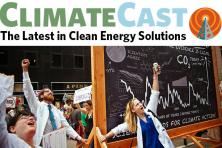Hurricane Harvey causes a world of hurt, and hopefully a wake-up call to us all
On August 25, Hurricane Harvey made landfall hitting Corpus Christi, Texas, and the world watched as history repeated itself -- devastating another Gulf Coast community just days before the 12th anniversary of Hurricane Katrina. Harvey illustrates that we have no time to lose; climate change is here, and we must both mitigate and adapt. Our hearts go out to the communities affected. The storm’s full impact may not be known until well after the waters recede, but we know that lives have been lost, thousands displaced, and homes permanently destroyed. It is impossible to say that any single storm or other weather event was “caused” by global warming (David Roberts points out that this is definitely the wrong question to ask). But, as Climate Solutions' Savitha Pathi observed, “we must not avoid talking about the grim lesson these disasters offer us about the increased risk and frequency of such catastrophic weather events that come with a changing climate.”
Among thoughtful responses to the storm, NPR provided an especially helpful piece to understand how climate change helped fuel this disaster. Veteran weather reporters indicated that they have never covered anything quite like it. Not only does Harvey show how climate change is making seasonal storms more extreme, it also reveals other vulnerabilities, from the toll climate disaster can have on the American oil and gas energy industry, to how underestimating flooding risk of cities makes things worse, and how climate disasters most gravely affect communities of color. Harvey’s impact also highlights infrastructure weaknesses, like dam and levee spillage and flood water’s ability to spread contamination of superfund sites, as well as how a lack of industry regulation layers peril on top of tragedy. The US gulf coast isn’t the only place in the world experiencing this type of devastation; in Southeast Asia, flooding following heavy monsoon rains has killed over 1,200 and kept 1.8 million children out of school. An estimated 40 million people are affected. These floods are yet another example of a seasonal event made more extreme because of a changing climate.
The grid: getting cleaner by the day
The grid is getting cleaner by the day, dispelling one of Big Oil’s favorite myths that clean energy is not sufficiently reliable to encompass a significant percentage of our electricity mix. Two new reports suggest that renewables will continue to rapidly expand -- solar could even provide up to half of global electricity by 2050. By the end of this year, global solar power capacity is expected to surpass nuclear. By 2022, it could more than double nuclear capacity. In California, lawmakers are considering a new proposal that would ensure only clean energy moves through the state’s electricity grid. Denmark has sold off its last oil company, and faced virtually no opposition for doing so. It’s another move that signals oil is taking a back seat to renewables, once and for all. Finally, remember how, before last month’s solar eclipse, there was a fair amount of hand-wringing about how the sun’s short disappearance would test the resilience of the solar-intensive grid in Northern California? Well, other power sources helped pick up the slack, confirming once again that renewables are raring to go.
Cutting pollution, creating solutions
Increasingly throughout the world, communities and governments are solidifying their commitment to cut pollution and create meaningful solutions.The nine northeastern states that participate in the Regional Greenhouse Gas Initiative (a program that prices and limits pollution) voluntarily agreed to lower the pollution cap by 30 percent, decreasing the amount companies are allowed to pollute. In Australia, the State of Victoria has sent a strong signal to investors, legally mandating a renewable energy target increase from 25 to 40 percent. From the US to down under, cutting pollution is proving to not just be a nice suggestion, but the way of the future.
Threats to agriculture and food production
Warming temperatures and the loss of oxygen will shrink fish species, including many types of fish upon which entire seafood industries are built. Rising temperatures are also projected to decrease crop yields, including staple crops like wheat and corn. Italy’s 4,000 year old wine industry is already feeling the heat, and Georgia’s peach orchards are not exactly having a sweet year.
In other impact news, climate change is helping tree-killing beetles to spread, putting entire ecosystems at risk. But it’s hard to think about beetles when our forests are facing an even more glaring problem: they’re on fire. From British Columbia, where wildfires have tripled the area’s annual carbon footprint, to Oregon where, in an unprecedented move, Cycle Oregon has cancelled its nationally acclaimed 2017 Classic due to wildfires. 44 percent of acres burning nationally are in Oregon, and 50 percent of those fighting fires nationally are in Oregon and Washington.
Publicly cheering, privately jeering: even Big Oil knows their impact
The new administration’s agenda to remove regulations and charge up a fossil fuel rebound is disheartening. You’d think Big Oil would be thrilled to encounter new government support. Publicly they are, but privately, oil companies and trade groups worry that rapid deregulation could backfire and set the stage for environmental disaster. Speaking of deregulation, the Federal Energy Regulatory Commission has approved a new pipeline project to move fracked gas from Appalachia, despite cries from local residents to consider safety and property rights. A new Energy Department report contradicts President Trump’s agenda to bring back coal, citing fracked gas as the cheapest form of energy and supposed reason why so many coal plants have shut down. In related industry news, Australia’s coal fleet may be completely gone by 2040 if plant closures continue at their current rate. In the US, Michigan will shut down another coal plant. Even Royal Dutch Shell is investing in an Australian solar project, and plans to invest as much a $1 billion in renewable energy ventures just like it. Follow the money to see where the future is headed...Big Oil is.
US Government stuck in reverse
The Trump administration’s attack on science continues. The National Institute of Environmental Sciences has deleted all references to climate change, including removing health fact sheets from its website. In Wisconsin, Cathy Stepp (a known climate-denier) has been appointed to lead the EPA’s regional office. Stepp previously served as Secretary of Wisconsin Natural Resources; during her tenure residents had to ask the EPA twice to step in after complaints about manure-contaminated drinking water were met with inaction. The Department of Energy has earmarked $50 million to explore projects that improve coal’s efficiency and reduce its environmental impact. The White House Council on Environmental Quality, signed into law by President Richard Nixon, requires that the President to appoint a council to “create and recommend policies to improve of the quality of the environment.” ThinkProgress reports that under President Trump, the committee has zero members. Secretary Tillerson will abolish the State Department’s envoy for climate change as part of the State Department’s overhaul.
In Brief: Exxon Lied
A new Harvard study confirms that Exxon misled non-scientific audiences about climate science, noting “a systematic discrepancy between what ExxonMobil's scientists and executives discussed about climate change privately and in academic circles and what it presented to the general public.” The peer-reviewed study contrasted the company’s scientific publications and internal communications over several decades with its public statements in advertising and op-eds. Internal documents clearly and commonly acknowledged human-caused climate change is real, while the company’s public voice sowed doubt and denial. While we are not surprised by such revelations anymore, the cynicism of the company’s deception is somewhat breathtaking, with so very much at stake.





